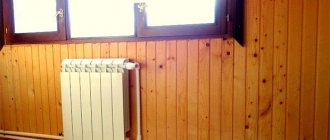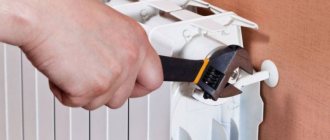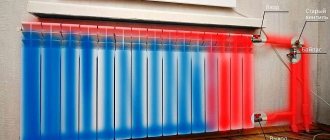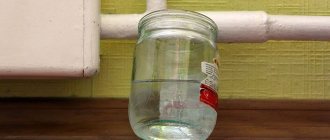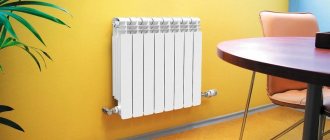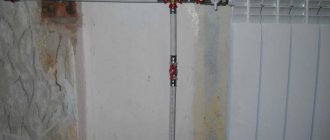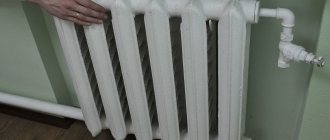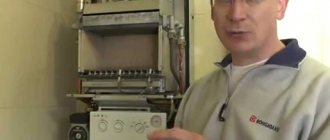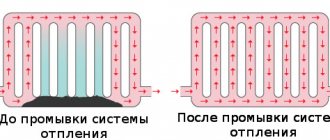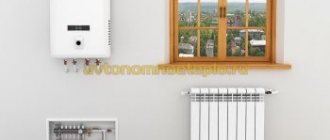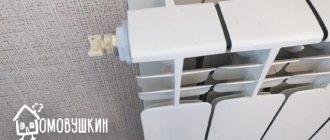Good afternoon, my dear regular reader! Today I will look at the reasons why heating radiators make noise in an apartment and how to deal with it.
If you are the happy owner of your own apartment, then most likely you are also the owner of pipes and radiators connected to the centralized heating system of an apartment building. You are not involved in the boiler, fuel, installation and configuration of a complex engineering system.
Often apartments do not have thermostats, and sometimes even valves before and after the radiator. Pipes and radiators only need to be washed occasionally. It would seem that this is the least troublesome heating option. But what to do if the apartment is suddenly filled with unusual, not very loud, but ominous sounds that make it difficult to sleep?
What types of noise can pipelines make?
The sounds emanating from heating system elements are legendary. Under certain circumstances, not only heating pipes make noise in the house, but also other pipelines. At the same time, the sound range of all sanitary systems is approximately the same. The most “musical” ones are metal pipes, but they also play unusual melodies. A water heating system can make a wide variety of sounds:
- murmur;
- gurgling;
- rattling;
- knock;
- crack;
- clicks;
- hum;
- whistling;
- howl.
Specific sounds signal the presence of problems in the heating system, so it is necessary to quickly identify and eliminate the source of the noise, since systematic exposure to it leads to disorders of the nervous system, interferes with sleep and reduces performance. Why is water noisy in heating pipes * Noise in heating pipes is caused by the following reasons:
- air jams;
- high speed of coolant movement due to incorrectly selected pipeline diameter or a decrease in the internal lumen of the pipe due to overgrowing of its walls;
- coolant leakage in emergency areas or through poorly closed valves;
- scale peeled off from the pipe walls or debris that got into the circuit during installation;
- faulty or incorrectly installed valves;
- excessive pump power or improper installation;
- wear of control valves or thermostatic heads;
- cavitation - the formation of steam bubbles in the coolant in the area of a sharp increase in the diameter of the pipeline (the appearance of an area of low pressure) with their subsequent collapse, destroying the equipment;
- violations of installation technology (use of polypropylene pipes with a diameter smaller than the calculated one, failure to observe the minimum distance between parallel sections of a metal pipeline during installation, installation of a filter or valve not in the flow direction indicated on it, etc.).
Important! The central heating always turns on noisily. When the system is filling, you can hear the murmur of the coolant, the heating of the circuit is accompanied by clicking sounds, and the air coming out of it is accompanied by a whistle. Maintenance of heating equipment before start-up can also be carried out using impact. Such noises usually disappear once the system is operational and are not a cause for concern.
*
If extraneous sounds appeared at the height of the heating season or did not disappear after the start-up took place, then this is a signal of the presence of malfunctions, and you should look for malfunctions not only in yourself or your neighbors in the riser, but also in the heating point or elevator unit - the source of the trouble may be far away outside the home, since sound waves travel well through pipes.
Methods for neutralizing noise
The source of noise often turns out to be in the locations of public utilities. The coolant pressure at the heating main entry point is the highest, so the slightest malfunction in it can immediately manifest itself in the form of strange sounds throughout the entire entrance. In a private house, the noisiest place is the furnace or heat generator room, where the boiler and its entire piping system are located.
Note: Aluminum and bimetallic radiators are especially sensitive to pressure changes. Thin metal transmits any vibrations through itself, like a megaphone. In such heating devices, the slightest technological noise acquires an amplified sound.
If the problem turns out to be a malfunction of collectively owned equipment, then you should not fix it yourself. Worn-out components can literally crumble at the slightest attempt to unwind them, and all the blame will be placed on the one who unauthorizedly interfered with the operation of the “perfectly debugged” system. It is better to send a complaint to the service organization and patiently wait for their representative to repair the faulty components.
A visual reminder with the coordinates of addressees if it is necessary to contact housing and communal services issues
*
If you were able to diagnose problems within your own or a neighbor’s home, then you should begin to eliminate them as quickly as possible. In this case, any delay is fraught with aggravation of the situation and complication of repair work.
Let's sum it up
From this article you learned why batteries make noise in an apartment or private house. We have identified the main reasons for the appearance of extraneous sounds:
- Incorrect pipe diameter;
- Incorrect pipe installation;
- Pressure changes;
- Air jams;
- Mounting brackets;
- Thermostat;
- Circulation pump;
- High coolant speed;
- System littering;
- Embedding pipes into the wall;
- Water leak;
- Wear of gaskets;
- Coolant;
- Depreciation of equipment.
We hope that the article was useful to you. Leave your opinions and questions in the comments. Don't forget to share the post with your friends!
Do you want to get help from a master, a specialist in this field? Go to the professional search portal. This is a completely free service where you will find a professional who will solve your problem. You do not pay for posting an ad, views, or choosing a contractor. If you are a master of your craft, then register on Pro and receive a flow of clients. Your profit is just one click away!
Humming, howling
The loudest and most unpleasant type of noise. Pipes can start buzzing out of the blue and give rise to poltergeist stories. However, mysticism has nothing to do with it, and communication with spirits will not save you from noise in the pipes.
When a hum occurs, you need to look for a coolant leak. First of all, a thorough inspection of your home is carried out, then all neighboring apartments. If everything is dry, then the search continues in the basement. A cloud of steam, a puddle or a whistle will help you easily determine the place where the water is leaking. In apartment buildings, repairs will be carried out by the management company, in private houses - by the owner of the property. After inspecting the problem area, a decision is made on how to eliminate the malfunction - by repairing or replacing the unit; sometimes it is enough to simply tighten a poorly closed valve.
Another reason for the hum may be the use of pipes in the heating system with a diameter smaller than the calculated one. In this case, the problem area is determined by ear, and the required section of the pipeline is replaced with material with greater permeability. With the correct selection of pipes and high-quality performance, you will no longer have to listen to the pipes hum.
Distribution unit of a central heating system in the basement of an old apartment building
conclusions
All of the noises listed above and how to prevent and eliminate them are aimed at optimizing the problem if pipes or heating equipment begin to make noise. The first important step in solving the problem is identifying the location of the source of the extraneous sound. The second step is to assess the scope of work and the required amount of materials. The third stage is assessing the possibility of self-repair or eliminating noise in other ways, or determining the need to call specialists. A situation may also arise in which the noise can last until the end of the heating season, which will make it easier to eliminate them when the boiler is turned off.
In a high-rise building, such issues should be resolved by the utility service, but it is better to monitor their work. By identifying the source of noise in the pipeline in a timely manner, you will save not only money and expensive equipment, but also your health.
Bubbling, crackling and clicking
Particles of debris, sludge or exfoliated scale, when moving through the pipes, hit the walls and rub against them, creating noise in the form of crackling or seething. A characteristic sound when clogged is also a clicking sound. To eliminate this type of noise, it is necessary to flush the system.
Foreign objects in the pipes will click until they come out. Therefore, all liquid is drained from the system through the drain valve. Using a hose, the old coolant with debris is directed into the sewer, the system is additionally washed with water (steel pipes are tapped on the outside with a wooden mallet to remove scale from the inside from the walls), after which the heating circuit is refilled.
Important! Before draining dirty water, it is better to dismantle the drain valve to allow large pieces of debris to come out and not clog the shut-off device.
*
Quite often, pipes crack and click due to a malfunction of the valve or its installation in the wrong direction of flow. The curved passage hole easily becomes clogged, and over time a plug may form in it, completely blocking the movement of the coolant. Partial blocking of the pipe lumen with debris creates noise when water passes through. If the valve is positioned the other way around, then liquid enters it not from the bottom side of the locking disc, but from above, which leads to destruction of the stem and separation of the valve. In this case, the movement of the coolant will also be accompanied by noise.
The most rational way out of the situation is to replace the valve, since it is already partially worn out in the wrong position and is therefore unpredictable after reinstallation. In the absence of a new unit, you can temporarily install the old one by replacing the sealing material of the threaded connections.
Advice: When choosing new shut-off and control valves, you need to keep in mind that ball (plug) valves are much more practical to use, can be installed in any direction and are not as sensitive to blockages as screw valves.
If you close the ball valve tightly, it can also become a source of noise. This is not a malfunction and can be corrected by opening it slightly or closing it completely. Valves with thermostatic heads can also make noise if the temperature set on them is close to the actual temperature in the room. In this case, the entrance to the radiator is not completely blocked, and the coolant passes through a small hole with a characteristic sound. To get rid of the noise, simply turn the head towards the sprocket.
Flushing
The next scenario is flushing. If you hear a loud, uniform noise in your heating riser, if your radiators are noisy and this happens for several hours, perhaps one of your neighbors is simply flushing their radiator. In fact, flushing usually takes from 10 to 20 minutes, but most residents find that the longer the battery is flushed, the better it will perform in the future. Therefore, the noise may linger.
Battery during cleaning
Quite exotic cases also happen. It's probably worth mentioning this. When the residents warmed themselves in this way, the radiator stood on the return side and, accordingly, heated rather weakly. The apartment owners found a simple way out of the situation - they set the riser to discharge. They shut off the valve on their riser below, below the radiator, and connected a hose, directed it into the toilet and thus used the discharge battery. This did help them survive the extreme cold that year, but naturally all the neighbors in this case enjoyed the noise from the radiators.
Murmuring, whistling
When air accumulates, you can hear the water bubbling in the heating pipes - a very common phenomenon. Air can enter the system during repair work, or be sucked in through loose connections - an air lock, regardless of its origin, prevents the normal circulation of the coolant. Not only does the water gurgle annoyingly, but the heating devices do not heat up properly. If an air lock forms that completely blocks the lumen of the pipe, the radiators after the problem section of the pipeline will remain cold.
Air always accumulates at the highest points of the system, since it is lighter than water. This is where special valves or automatic air collectors are usually installed. Radiators located at the end of a horizontal branch must be equipped with a Mayevsky tap. In some types of systems, each heating device has a so-called “air vent”. The units of modern designs can be easily turned by hand; older ones will have to be controlled using an adjustable wrench or a screwdriver.
First of all, you need to try to bleed the air from the radiators of your apartment. The operation begins with the coldest device, if available. Often it is local air pockets that interfere with heating. If this does not give results, then you need to ask your neighbors on the top floor to find the appropriate tap and open it. In difficult situations, it is better to call a qualified plumber. An indicator of success - the release of air - is a characteristic whistle.
Tip: To avoid getting burned, you need to open the Mayevsky tap smoothly, being careful - the hot water in the system is under pressure. In addition, to collect water that will flow from the radiator, it is necessary to first prepare a container of sufficient volume with a wide neck.
*
The noise is not in the pipes, but in the heating radiators
In order to correctly diagnose the reason why the heating radiator is noisy, you need to make sure that their technical condition is normal. Often, a broken radiator begins to make various noises, and when inspecting the case, a defect or damage can be diagnosed. In this situation, it needs to be repaired or replaced with a new one.
If no obvious problems were found, we try to more accurately determine the type of noise. Most often, clicking and/or humming sounds come from radiators. In this case, there may be the following problems:
- Incorrect radiator installation. The coolant flow transmits vibrations to the radiator, and it, in turn, to the mounting units in the wall.
- Foreign objects inside. Often something gets into the system and settles in the radiator and dangles there, or initially the foreign object was already in the radiator itself and was not shaken out during installation.
- Air entry. This causes the sound of flowing water or just a hum.
- The thermostat is not working properly. The shut-off rod has shifted, which is why the noise effect occurs.
These are the most common radiator problems. Make sure you have correctly diagnosed the problem before proceeding with the fix.
Knocking, rattling
The cause of the knocking noise is usually a poorly secured pipe or radiator bracket. The slightest vibration when the coolant passes through such a unit causes rattling, and if the supports are very loose, the radiator hits the fasteners. The system will stop making noise if the brackets are firmly fixed. To dampen vibration, you can install a heat-resistant rubber gasket between the device and the support.
Sometimes knocking noises can be caused by parallel or intersecting pipes being too close together. During temperature deformations, one pipeline begins to touch another, beats against it and becomes a source of noise. Sound insulation can save the situation if the available gap is enough to accommodate it. Otherwise, to eliminate the knocking, you will have to shift the problem area.
In some cases, knocking on heating pipes in apartment buildings is caused by dissatisfaction with neighbors. This type of noise is usually characterized by a lack of periodicity and occurs in the form of a reaction to certain provoking actions. It’s just that all residents have to “enjoy” the specific sounds. Technical measures will not help here; sound insulation can only partially save. Conflicts with neighbors can only be resolved through dialogue and diplomacy.
How to improve system performance?
The comfortable sensations of apartment residents depend on how well the batteries are heated. If the heat is not enough, then there is a reason to think about how to increase the efficiency of the heating battery in the apartment.
These can be quite simple actions:
- Getting rid of air jams.
- Flushing radiators to clean them of scale, salts and dirt accumulated over years of operation.
- Removing dust from the battery.
- Installing a reflective screen, for which you can use ordinary foil, securing it behind the radiator. It’s even better if it’s a metal sheet or plate, since they will not only reflect the heat and prevent it from passing through the wall to the outside, but also, when they heat up themselves, will become an additional source of heat.
- Blowing air over a heating radiator in an apartment using a fan is a fairly popular and effective method of warming an apartment. Any device is suitable for this, the main thing is that it operates silently and consumes little energy.
These simple steps can significantly improve the operation of the system, but this can only be checked by knowing the standards for the heating radiators in the apartment.
In this case, we mean their heating level:
- for a two-pipe heating system it is +95 degrees (maximum values are indicated);
- with a single-pipe coolant supply - +115;
- The main indicator of heating batteries in apartments is considered to be +85-90 degrees.
You can measure the heating of radiators with a regular thermometer.
https://youtube.com/watch?v=6k3cqepD9yo
Expert advice on preventing unwanted sounds from appearing in the heating circuit
The likelihood of noise in heating pipes can be reduced by adhering to the following professional recommendations:
- when welding polypropylene pipes, strictly observe the heating time of the parts being joined, since overheating leads to a decrease in the working clearance, and underheating leads to low reliability of the connection and a high probability of leakage;
- bend metal-plastic pipes using a pipe bender to avoid reducing the diameter of the pipeline in the bending section;
- heating circuit pipes must be equipped with heat and sound insulation;
- when welding metal electrically, you need to use only high-quality electrodes of the appropriate brand;
- at the highest points of the heating system and at the last devices of each branch, it is necessary to have Mayevsky valves for air release;
- valves and filters must be installed only in accordance with the specified flow direction;
- the pump power must correspond to that required for a particular system;
- To avoid airing, radiators should be installed strictly horizontally - using a bubble or laser level;
Checking the installation of a bimetallic radiator using a bubble level - debris, welding drops, etc. entering the heating system pipeline. not acceptable;
- In order for the switched-on pump to make less noise during operation, it must be installed on vibration inserts and equipped with a sound-insulating casing;
- in autonomous heating systems, it is important to monitor the condition of the pumps, since the slightest malfunctions significantly increase the level of noise emanating from them; Changing the operating mode of the pump sometimes allows you to get rid of shocks and clicks;
- using only high-quality plumbing fixtures, fittings and auxiliary materials significantly reduces the risk of extraneous noise;
- It is necessary to periodically flush the system, preventing a decrease in the working clearance of the pipes due to various types of deposits and the associated appearance of unpleasant sounds.
Important! In searching for the source of noise, a dry stick (the handle of a shovel) can help, one end of which is pressed tightly to the ear, and the other - alternately to the elements of the heating system. In the problem area, the noise will manifest itself louder and clearer.
Let's look at each situation in more detail.
Different pipe diameters
If the pipes have different diameters, this may cause noise when the coolant moves. The problem is solved by installing pipes of the same section.
Excessive pressure in the heating system
Excessive pressure can cause noise in the radiator. To solve the problem, you need to adjust the pressure in the entire heating system. Owners of private houses can do this on their own; residents of apartment buildings will have to contact the building management. Typically, to regulate the pressure, install a washer on the elevator nozzle or install a regulator.
When the system is aired, a characteristic sound of bubbling water is heard. Residents of apartment buildings hear the same sound at the beginning of the heating season, when the radiators are filled with hot water. Air pockets are released using a Mayevsky tap.
Incorrect installation of thermal valve
The thermovalve is part of the temperature controller. If the thermal valve is not installed correctly, the fluid creates pressure on the valve and noise occurs. The thermal valve must be installed on the coolant supply, the flow area must be correctly adjusted (on valves with installation settings). There are situations when one of the residents has a thermostat installed, and the radiators are humming for all the neighbors in the riser.
Pump noise in the boiler room
If the pump power is selected incorrectly and it operates at the limit of its capabilities, or, conversely, with a large reserve of power, noise occurs. Noise can be transmitted over long distances through pipes. There are other possible causes of noise from the pump - malfunction, installation errors, lack of hydraulic compensators.
Incorrect boiler operation
If the boiler output is more or less than required, it may create noise. Normally, the boiler operating power should be from 75 to 80% of the rated power of the device. How can you tell if the boiler is working properly? The device should turn on and off once every 20-40 minutes. If the boiler turns on and off more often, most likely its operation is not regulated. Setting the boiler operating mode will solve the problem.
Uneven supply pipes
If the pipes are uneven, “gurgling” sounds may occur when the coolant moves. In this case, the problem can only be solved by replacing the liner.
Battery displacement when heated
The battery is hung on brackets. When heated, the metal expands, the batteries move along the bracket, and a cracking sound is heard. To eliminate the problem between contacting surfaces, you can use rubber spacers.
If debris gets into the battery, a characteristic cracking sound occurs. Flushing the heating system may be necessary to remove blockages.
Crackling or clicking of the batteries may be due to the fact that there has been a breakthrough in the heating main and the coolant is contaminated with mechanical particles.
Changes in coolant temperature
If the temperature of the coolant changes (first hot water flows, then cooled water), a knock may be heard due to the fact that the metal either expands or contracts due to the temperature difference.
At home you always want to immerse yourself in an atmosphere of comfort and tranquility. Various everyday troubles can significantly irritate a person who is tired after work or household chores, especially if the problem concerns noise. And if you can do something on your own with restless neighbors and the sound of cars passing on the street (ask them to be quieter, install high-quality double-glazed windows), then in the case of constantly noisy heating radiators, homeowners are lost and do not know how to fix the problem.
Most often, the noise of radiators in both apartment buildings and private houses haunts residents for several simple reasons - an incorrectly installed system or errors in its operation. Let's take a closer look at why heating radiators make noise in an apartment or house.
How to get rid of noise in heating radiators
